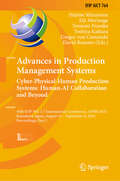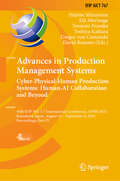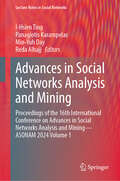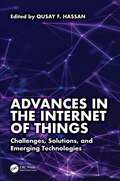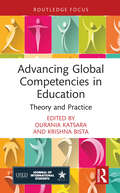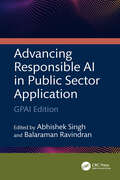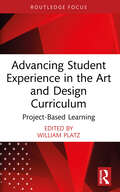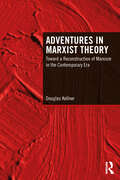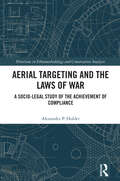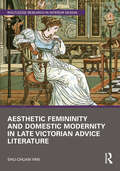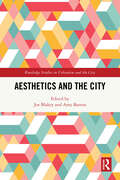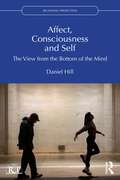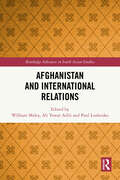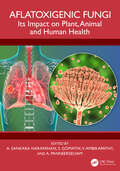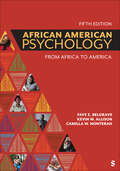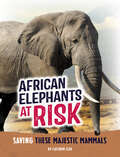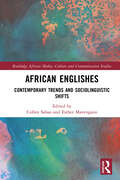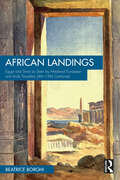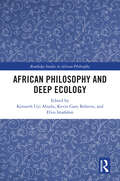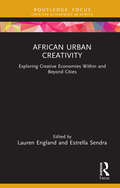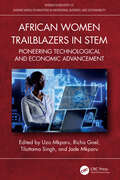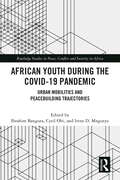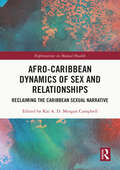- Table View
- List View
Advances in Production Management Systems. Cyber-Physical-Human Production Systems: 44th IFIP WG 5.7 International Conference, APMS 2025, Kamakura, Japan, August 31-September 4, 2025, Proceedings, Part I (IFIP Advances in Information and Communication Technology #764)
by Hajime Mizuyama Gregor Von Cieminski David Romero Tomomi Nonaka Toshiya Kaihara Eiji MorinagaThe six-volume set IFIP AICT 764-769 constitutes the refereed proceedings of the 44th IFIP WG 5.7 International Conference on Advances in Production Management Systems, APMS 2025, held in Kamakura, Japan, from August 31st to September 4th, 2025. The 227 full papers presented in these proceedings were carefully reviewed and selected from 247 submissions, which cover a broad array of research and technological developments on the present and future of &“Cyber-Physical-HUMAN Production Systems&”. They were categorized under the following topical sections: Part I: Human-centred Work Systems for the Operator 4.0/5.0 in Manufacturing, Logistics, and Service Domains; AI-Driven Decision Support and Human-AI Collaboration for Smart and Sustainable Supply Chains; Digital Twins and AI for Dynamic Scheduling and Human-Centric Applications. Part II: Smart Manufacturing Evolution: Integrating AI and the Digital Twin for Human-centric, Circular and Collaborative Production Systems; Human-centered Service Engineering and Digital Transformation for Sustainable Service Industries; Shaping Human Capital for Industry 5.0: Skills, Knowledge and Technologies for Human-centric, Resilient, and Sustainable Manufacturing; Experiential Learning in Engineering Education; Theoretical and Practical Advances in Human-centric, Resilient, and Sustainable Supply Chain Management; Maintenance and Asset Lifecycle Management for Sustainable and Human-centered Production; Methods and Tools for Assessing the Value of Digital, Sustainable and Servitized Offerings of Manufacturing Companies. Part III: Digital Transformation Approaches in Production and Management; Digital Technologies in Manufacturing and Logistics: Exploring Digital Twin, IoT, and Additive Manufacturing; Enhancing the Value Creation Mechanisms of Manufacturing Value Chains through Digital Platforms, Circular strategies, and Servitization Principles. Part IV: Enhancing Value Chain Resilience through Digital Technologies; How Supply Chain Can React to Internal and External Disruptions?; Mechanism Design for Production, Service and Supply Chain Management; Transforming Engineer-to-Order Projects, Supply Chains, and Systems; Designing Next Generation Lean Models Supporting Social, Sustainable, and Smart Production Systems. Part V: Advancing Eco-efficient and Circular Industrial Practices; Upgrade Circular Economy for the Manufacturing Industry; Cyber-Physical System-Based Approaches to Achieve Sustainability; Industrial Data Spaces and Sustainability; Enabling Circularity in Batteries & E-Waste with Digital Technologies: From Production to Recycling; Circular and Green Manufacturing; Sustainable Product Design and Engineering. <span style="font-size: 11.0pt; line-height: 115%; font-family: 'Calibri',sans-serif; mso-fareast-font-family: 'Times New
Advances in Production Management Systems. Cyber-Physical-Human Production Systems: 44th IFIP WG 5.7 International Conference, APMS 2025, Kamakura, Japan, August 31-September 4, 2025, Proceedings, Part IV (IFIP Advances in Information and Communication Technology #767)
by Hajime Mizuyama Gregor Von Cieminski David Romero Tomomi Nonaka Toshiya Kaihara Eiji MorinagaThe six-volume set IFIP AICT 764-769 constitutes the refereed proceedings of the 44th IFIP WG 5.7 International Conference on Advances in Production Management Systems, APMS 2025, held in Kamakura, Japan, from August 31st to September 4th, 2025. The 227 full papers presented in these proceedings were carefully reviewed and selected from 247 submissions, which cover a broad array of research and technological developments on the present and future of &“Cyber-Physical-HUMAN Production Systems&”. They were categorized under the following topical sections: Part I: Human-centred Work Systems for the Operator 4.0/5.0 in Manufacturing, Logistics, and Service Domains; AI-Driven Decision Support and Human-AI Collaboration for Smart and Sustainable Supply Chains; Digital Twins and AI for Dynamic Scheduling and Human-Centric Applications. Part II: Smart Manufacturing Evolution: Integrating AI and the Digital Twin for Human-centric, Circular and Collaborative Production Systems; Human-centered Service Engineering and Digital Transformation for Sustainable Service Industries; Shaping Human Capital for Industry 5.0: Skills, Knowledge and Technologies for Human-centric, Resilient, and Sustainable Manufacturing; Experiential Learning in Engineering Education; Theoretical and Practical Advances in Human-centric, Resilient, and Sustainable Supply Chain Management; Maintenance and Asset Lifecycle Management for Sustainable and Human-centered Production; Methods and Tools for Assessing the Value of Digital, Sustainable and Servitized Offerings of Manufacturing Companies. Part III: Digital Transformation Approaches in Production and Management; Digital Technologies in Manufacturing and Logistics: Exploring Digital Twin, IoT, and Additive Manufacturing; Enhancing the Value Creation Mechanisms of Manufacturing Value Chains through Digital Platforms, Circular strategies, and Servitization Principles. Part IV: Enhancing Value Chain Resilience through Digital Technologies; How Supply Chain Can React to Internal and External Disruptions?; Mechanism Design for Production, Service and Supply Chain Management; Transforming Engineer-to-Order Projects, Supply Chains, and Systems; Designing Next Generation Lean Models Supporting Social, Sustainable, and Smart Production Systems. Part V: Advancing Eco-efficient and Circular Industrial Practices; Upgrade Circular Economy for the Manufacturing Industry; Cyber-Physical System-Based Approaches to Achieve Sustainability; Industrial Data Spaces and Sustainability; Enabling Circularity in Batteries & E-Waste with Digital Technologies: From Production to Recycling; Circular and Green Manufacturing; Sustainable Product Design and Engineering. <span style="font-size: 11.0pt; line-height: 115%; font-family: 'Calibri',sans-serif; mso-fareast-font-family: 'Times New
Advances in Smart Computing and Applications: First International Conference, ICASCA 2025, Ahmedabad, India, February 15–16, 2025, Proceedings (Communications in Computer and Information Science #2619)
by Rajkumar Buyya Nirbhay Chaubey Savita Gandhi Harshal Arolkar Prerna AgrawalThis book constitutes the refereed proceedings of the 1st International Conference on Advances in Smart Computing and Applications, ICASCA 2025, held in Ahmedabad, India, during February 15–16, 2025. The 25 full papers were presented in this volume were carefully reviewed and selected from 112 submissions. They focus on Machine Learning, Deep Learning, Transfer Learning, Neural Computing, Artificial Intelligence, Reinforcement Learning, Recommendation systems, Soft computing, Intelligent Systems, Pattern Recognition, Natural Language Processing, Big Data Analytics, Networks, Text Mining, Web Mining, Data Streams, Image Processing, Distributed Databases, Block Chain.
Advances in Social Networks Analysis and Mining: Proceedings of the 16th International Conference on Advances in Social Networks Analysis and Mining - ASONAM 2024 Volume 1 (Lecture Notes in Social Networks)
by I-Hsien Ting Panagiotis Karampelas Reda Alhajj Min-Yuh DayThis book explores the evolution of social network analysis and mining (SNAM), a field that originated in social and business communities but has expanded significantly in recent years. The rise of online social platforms, email logs, phone records, and instant messaging systems has driven the development of advanced techniques for analyzing social networks, drawing heavily on graph theory and machine learning. As the Web increasingly becomes a social medium, it fosters human interaction, the sharing of experiences and knowledge, and the formation and evolution of communities. This transformation has amplified the importance of SNAM in fields such as academia, politics, homeland security, and business, where understanding the complex relationships between networked actors is crucial. This volume presents a comprehensive collection of cutting-edge research and developments in SNAM, offering a valuable resource for researchers and practitioners seeking to deepen their understanding of social networks and their applications.
Advances in the Internet of Things: Challenges, Solutions, and Emerging Technologies
by Qusay F. HassanMany reports estimated that in 2024, the number of Internet of Things (IoT) devices exceeded 18 billion worldwide, with predictions suggesting that it could reach nearly 40 billion by 2033. Despite primarily being consumer devices, a growing number of them will find use in industrial and enterprise applications. This shows the significance of IoT and how it shapes the future. However, to realize its full potential, we must address its emerging challenges and highlight recent applications, advances, and trends, which is the focus of this book.Security and privacy represent some of the key challenges IoT adopters face. The severity of these issues is exacerbated by the growing number of IoT devices, the expansion of Industry 4.0 (and the emergence of Industry 5.0), and the significant increase in cybersecurity attacks. Considering that ensuring security and privacy is crucial for the successful adoption of IoT, this book dedicates several chapters to these areas. This book also introduces some novel models that improve IoT environments and presents several practical implementations that utilize IoT to demonstrate some of its real‑world applications. Furthermore, it examines several emerging technologies that enable the realization of advanced IoT environments. We see most IoT advances in three main areas: the integration of artificial intelligence/machine learning, network technologies, and hardware design. Therefore, this book dedicates several chapters to these areas. Most chapters touch on artificial intelligence/machine learning, emphasizing the significance of these technologies in today’s and next‑eneration applications.The main objective of this book is to capture the state of the art in IoT and explore some of its emerging challenges, solutions, and technologies. This peer‑eviewed book serves as a reference for researchers, academics, practitioners, and graduate‑evel students.
Advancing Global Competencies in Education: Theory and Practice (Routledge Studies in Global Student Mobility)
by Krishna Bista Ourania KatsaraAdvancing Global Competencies in Education offers an in-depth and insightful exploration into the evolving field of international education and intercultural communication. This comprehensive volume brings together innovative practices, case studies, and diverse perspectives from prominent scholars and practitioners across the globe, making it an essential resource for the contemporary educational landscape. With a strong emphasis on diversity, inclusion, and the enhancement of intercultural competence, this collection offers both theoretical insights and practical strategies. It serves as a vital resource for educators, policymakers, and practitioners dedicated to promoting intercultural understanding and collaboration within educational settings.
Advancing Responsible AI in Public Sector Application: GPAI Edition
by Abhishek Singh Balaraman RavindranResponsible use of AI in public sector applications requires engagement with various technical and non-technical areas such as human rights, inclusion, diversity, innovation and economic growth. The book covers topics spanning the technological socio-economic spectrum, including the potential of AI/ML technologies to address social and political inequities, privacy-enhancing technologies for datasets, friction-less data sharing and data stewardship models, regional/geographical inequities in extraction and so forth.Features: Focuses on technical aspects of responsible AI in the public sector Covers a wide range of topics spanning the technological socio-economic spectrum Presents viewpoints from public sector agencies as well as from practitioners Discusses privacy-enhancing technologies for collecting, processing and storing datasets, and friction Reviews frameworks to identify and address biased AI outcomes in the design, development and use of AI This book is aimed at professionals, researchers and students in artificial intelligence, computer science and engineering, policy-makers, social scientists, economists and lawyers.
Advancing Student Experience in the Art and Design Curriculum: Project-Based Learning (Routledge Focus on Design Pedagogy)
by William PlatzAdvancing Student Experience in the Art and Design Curriculum: Project-Based Learning will renew the critical attention paid to projects in the art and design curriculum and rigorously consider impacts on student experience.How exactly do we conceive of ‘projects’ in the context of a post-secondary creative arts curriculum? Each chapter in this book confronts the project as a specific, potent and transformative site of learning with vast engagement potential for the contemporary student. What unites the project-based learning methods in this book is an emphasis on the motivated and purposeful activities of the learners that result in tangible making and doing. Craft-based learning, practice-based learning, experimental learning design, culturally informed practices and reconsideration of obsolete learning mechanisms all coalesce in this text and evidence the innovativeness and abiding power of project-based learning.Each author in this book describes a diverse experience of learning that serves as an exemplar of project-based learning and illuminates the histories, theories and dynamics of the method for teachers, learning designers, educational theorists and interdisciplinarians.
Adventures in Marxist Theory: Toward a Reconstruction of Marxism in the Contemporary Era
by Douglas KellnerAdventures in Marxist Theory provides an introduction and overview of Marxian theory to demonstrate its contemporary relevance to social and political theory and a range of disciplines from philosophy to economics in both the humanities and the social sciences. The text argues that current historical developments and the evolution of economics, politics, society, culture, technology, and everyday life demonstrates the contemporary relevance of Marxism in both theory and politics in the contemporary era.The book presents a twenty-first century Marxism relevant to theorizing contemporary state capitalist and technological societies, critically dissecting their major social and political issues and problems, while advancing progressive social transformation in the interests of increased democracy and social justice. The volume opens with an Introduction describing a multi-disciplinary and critical approach to Marxism and its application to a wide range of contemporary issues, including the alienation of labor in the workplace, social divisions, and injustices such as classism, sexism, racism, and homophobia, and questions of technology, social media, and AI, as well as problems of ecological crisis, autocracy, and state oppression. Specific chapters address the Marxian critique of capitalism and theory of socialism, its concept of ideology and morality, its methodological synthesis of social science, critical theory, and its analyses of globalization, technology, and democracy.Written by a distinguished scholar of Marxism, critical theory, and cultural and political studies, the volume will be a key resource for instructors, students, and readers in historical and contemporary sociology, social and critical theory, political sociology, political and cultural studies, and Marx and Marxist studies.
Aerial Targeting and the Laws of War: A Socio-Legal Study of the Achievement of Compliance (Directions in Ethnomethodology and Conversation Analysis)
by Alexander P. HolderA ground-breaking socio-legal investigation of the in situ legal considerations involved in targeting and the use of force, Aerial Targeting and the Laws of War develops a new kind of evidence base for international action relating to the protection of civilians.Investigating the materials surrounding a civilian casualty incident that took place in Afghanistan in 2010, the book explores how a single strike – which was conducted in light of intelligence gathered by a militarised drone crew and resulted in the deaths of at least 15 civilians – became a lawful strike, that is, a strike that was deemed to have been compliant with the laws of war both at the point at which munitions were released and following two internal investigations. Through an ethnomethodological engagement with the transcripts, interviews, reports, and other materials associated with the incident, Alexander P. Holder examines the methods by which military personnel produce and maintain legitimate targets for the use of force.Re-focusing debates surrounding civilian harm upon the praxeological details of the military practices, which generate such harms, this book will appeal to scholars of sociology, military studies, and socio-legal studies with interests in the rules of war and ethnomethodological approaches to research.
Aesthetic Femininity and Domestic Modernity in Late Victorian Advice Literature (Routledge Research in Interior Design)
by Shu-chuan YanAesthetic Femininity and Domestic Modernity in Late Victorian Advice Literature considers how the domestic interior is constituted, imag(in)ed, contested, and mediated in the public forum of advice literature. It interrogates the construction and negotiation of aesthetic femininity and domestic modernity within the larger contexts of the New Journalism, the New Art Criticism, a new girls’ culture, and the emerging New Woman phenomenon in Britain.This book presents extensive new search on women-authored advice literature, including domestic advice manuals, home decoration books, and periodicals for young girls and adult women, within the discourse of household art. Part One justifies girls’ presence in the cultivation of beauty and taste at home. The practice of home decoration can be appropriated as a mode of agency and subjectivity for a girl to articulate her own voice and specific positioning as she grows toward womanhood. Part Two uncovers the ways in which advice literature serves as a mediator of decorating practices to help foster the affinities between gentlewomen’s domestic bodies and decorated interiors.Aimed at an interdisciplinary audience, this book adds to the growing body of scholarship on the studies of home cultures, art and interior design, nineteenth-century studies, and the social history of women.
Aesthetics and the City (Routledge Studies in Urbanism and the City)
by Joe Blakey Amy BarronAesthetics and the City engages aesthetics to explore the role of the city in urban experience. Drawing on diverse theories and global case studies, this edited collection examines how aesthetics relates to how cities and urban spaces are perceived, organised, and transformed.This book celebrates and ponders the wide diversity of aesthetic approaches within urban studies, noting that the way aesthetics is understood impacts what can be understood about cities and the urban order more generally. In its most general sense, aesthetics refers to our sensuous relation to the world. It invariably figures in how we make sense of the city and ourselves—bound to how urban life is experienced imaginatively, materially, socially, culturally, and politically. In an era where scholars have expressed concern at epistemological city-centrism, aesthetics is proposed as a versatile concept through which the centrality of the city to urban thought can be assessed. The book also explores how aesthetics intersects with a range of tangential concepts including power, the political, art, and affect. Ultimately it makes the case that this diverse ensemble of approaches to aesthetics can enable scholars to understand the city and its enduring relevance to urban thought.This book focuses on the concepts of "aesthetics" and "the city" and will appeal to scholars and students in urban studies, human geography, planning, politics, and sociology.
Affect, Consciousness and Self: The View from the Bottom of the Mind (Relational Perspectives Book Series)
by Daniel HillThis book argues that mental life is organized by and around affect. It proposes a clinical model for understanding how affect influences states of consciousness and self. It illustrates how, from moment to moment, affect determines the world we know, how we are disposed to being in it, and our capacity to function in it.After introducing consciousness and self as features of mind that have posed daunting problems for philosophy, neurology, and psychoanalysis, subsequent chapters propose a model for understanding them at the clinical level. Initial chapters are devoted to the influence of affect on the structure and dynamics of normal waking consciousness and on the self’s capacity to act agentically, to relate intersubjectively, and to develop itself. Final chapters discuss disordered states of consciousness and impeded self‑functioning, due to affect dysregulation and what all this looks like in patients with preoccupied and avoidant attachment patterns.Drawing on psychoanalysis, attachment theory, interpersonal and affective neurobiology, and traumatology, this book offers a fresh perspective on the importance of affect for psychoanalysts and psychodynamic psychotherapists.
Afghanistan and International Relations (Routledge Advances in South Asian Studies)
by William Maley Paul Lushenko Ali Yawar AdiliThis book explores various dimensions of recent international relations scholarship, taking the case of Afghanistan as a point of departure for discussion of these different themes.Contributors investigate a broad range of topics, including international relations theory, the nature of global order, ‘othering’ discourses, diplomacy, international law, the transformation of war, terrorism, gender politics, social media, state building, democratisation, refugee movements, globalisation, and historical lessons. The Afghanistan case helps illuminate the complexities of all these areas of analysis, and the book takes the analysis of Afghanistan in new directions. Theoretically, the authors interrogate the Afghanistan case’s implications for international relations, and vice-versa, by integrating multiple and complementary global or structural, state or institutional, and behaviouralist or leader-centric lenses. Conceptually, the chapters bridge the gap between theory and practice, thus reflecting the emergence of a problem-oriented approach to international relations scholarship. Methodologically, the research design employed by the authors is best characterised as ‘analytical eclecticism’. The majority of contributors originate from Afghanistan, something which again makes this book notable, and all three editors have extensive experience from time spent in Afghanistan.Using the Afghan case to explicate the importance of the relevance of theory and its related concepts to international relations studies, this book will be of interest to researchers in the field of international relations, Asian and Middle East Studies.
Aflatoxigenic Fungi: Its Impact on Plant, Animal and Human Health
by A. Panneerselvam A. Sankara Narayanan S. Gomathi V. AmbikapathyAflatoxigenic fungi, primarily belonging to the Aspergillus genus (A. flavus, A. parasiticus), are responsible for producing aflatoxins—highly toxic and carcinogenic secondary metabolites. These fungi pose significant risks to plant health, animal health, and human well-being due to their widespread contamination of food and feed. Aflatoxigenic fungi impact plants by causing diseases, and yield loss leads to economic loss and contamination. In connection with animals, aflatoxigenic fungi create toxicity in livestock, contamination of animal products, mortality, and economic loss. Finally, concerning humans, aflatoxigenic fungi lead to acute toxicity, carcinogenic effects, immune suppression, and nutritional risk.Features: Provides a systemic review of the recent developments in aflatoxigenic fungi on various biotic organisms Includes an overview of the impact of aflatoxins on various plants and on the agricultural economy Describes the role of aflatoxins in human health, including infants and in cancer Contains special emphasis on the control of aflatoxigenic fungi by nanomaterials and plant bioactive components Discusses the detection of aflatoxigenic fungi by surface-enhanced Raman spectroscopy (SERS)
African American Psychology: From Africa to America
by Faye Z. Belgrave Kevin W. Allison Camilla W. NonterahAfrican American Psychology: From Africa to America provides a comprehensive and integrated introduction to the field. The Fifth Edition presents recent advances and developments in African American psychology, including new coverage of systematic and institutional racism, Black empowerment, COVID-19′s impact on Black communities, and increased attention to heterogeneity within the Black community.
African American Psychology: From Africa to America
by Faye Z. Belgrave Kevin W. Allison Camilla W. NonterahAfrican American Psychology: From Africa to America provides a comprehensive and integrated introduction to the field. The Fifth Edition presents recent advances and developments in African American psychology, including new coverage of systematic and institutional racism, Black empowerment, COVID-19′s impact on Black communities, and increased attention to heterogeneity within the Black community.
African Elephants at Risk
by Kathryn ClayAfrican elephants have behaviors and features that keep them safe from predators, from the herds they live in to their large size. But these elephants are endangered. Because of humans, their habitat is shrinking, and climate change is hurting their food supply and their health. Human hunters are also putting these creatures at risk. Readers will learn why African elephants are at risk, what it means to be endangered, and how people can help. Each title includes activities and trivia questions to help readers connect with the content.
African Englishes: Contemporary Trends and Sociolinguistic Shifts (Routledge African Media, Culture and Communication Studies)
by Esther Mavengano Collen SabaoThis book investigates the functions and linguistic forms of African Englishes, and what this means for languages indigenous to Africa.It examines the historical imposition of English on the continent, as part of a broader project of cultural imperialism, and traces its transformation from a colonial tool to a dynamic and diverse language, examining its set of contemporary usage patterns, and its likely future directions. Thorough diverse critical approaches, this book unpacks how language contact has given rise to distinct variations including second language varieties, pidgins and creoles, that are moulded by Africa´s linguistic and cultural diversity. Drawing on case studies from West, East, and Southern Africa, this book illuminates contemporary English usages in multilingual spaces, where cultural and linguistic plurality drive ongoing shifts in communication. More than just being a study of language change, this book calls for a reassessment of the future of African Englishes and their impact on indigenous languages.Thus, the book is an essential read for scholars and students in linguistics, African Studies, and World Englishes, as it contributes fresh insights into the intersections of language, culture, identity, and power in modern-day African lifeworlds.
African Landings: Egypt and Sinai as Seen by Medieval European and Arab Travellers (4th–15th Centuries)
by Beatrice BorghiThis book seeks to break free from Eurocentric historical perspectives of medieval-era travel through Egypt and Sinai by focusing on the testimonies of 4th to 15th-century travellers from the African continent, especially pilgrim diaries from the Arab Muslim Egyptian world.Humanity's past is the story of movements by peoples who reshaped and redefined their identity and reported their impressions to a gradually diversified public—migratory currents that transported not just goods but ideas, intellect, culture and inventions. Focusing on Egypt in the Middle Ages—its cities, its suburbs and hinterland, and the many faces of its landscape—can provide us with answers to topical issues, as well as a new and better understanding of Levantine Mediterranean history. These diaries tell of objects, calendars, written works and artworks, sculptures, frescoes, monuments, musical instruments, animals, foodstuffs, and finally, of material and immaterial heritages—all valuable sources for understanding world history and posing questions about their, and our own, preconceptions.This volume will be of interest to students, scholars, and general readers of medieval history, Mediterranean history, travel history, and religious history.
African Philosophy and Deep Ecology (Routledge Studies in African Philosophy)
by Kenneth Uyi Abudu, Kevin Gary Behrens, and Elvis ImafidonThis book investigates African philosophical contributions to the concept of deep ecology, which advocates for rethinking human and non-human relationships within our ecosystems, by promoting the inherent and earned worth of all beings.With ecological crises impacting lives around the world, this book interrogates deep ecology thinking from African philosophical perspectives, highlighting the continent’s important ontological, epistemological, ethical, aesthetic, and broad philosophical contributions. The book investigates issues such as the eco-phenomenology of human / non-human animals’ relations, Ubuntu and the environment, the superiorist fallacy, environmental belongingness, the impact of colonization and modernity on non-human trauma, the politics of ecological narrative about African places, the question of moral status, African socialist perspectives, the question of degrowth, selective subordination, biodiversity loss, land ethics, the ontology of waste, and the concept of personhood in relation to global climate and ecological justice.Providing a significant intervention in our understanding of the ecological crises and our duties toward ecosystems and the non-human other in the twenty-first century, this book is an important read for researchers, advocates and other stakeholders working in the fields of environmental philosophy, climate change, indigenous studies, and African Studies.
African Urban Creativity: Exploring Creative Economies Within and Beyond Cities (Creative Economies in Africa)
by Lauren England Estrella SendraThe edited collection, African Urban Creativity: Exploring Creative Economies Within and Beyond the Cities, seeks to contribute to understanding creative economies in Africa, specifically the urban dynamics of creativity and the urbanisation of the creative economy. In doing so, it also acknowledges the role of the periphery and rural settings within their inputs and dialogic relation to the city.The book contains six original contributions from academic researchers and creative practitioners, bringing together a range of disciplinary perspectives and presenting case studies from across the continent (Ghana, Kenya, Nigeria, Senegal and South Africa). The book is structured in two parts. Part 1 explores different dynamics of urban culture, identities and local development opportunities. Part 2 focuses on the complex dialogue between cities and their peripheries or rural settings. The editors’ conclusions reflect key themes of leadership, social and cultural development and urban-rural connectivity, and present implications of policy and practice.This text provides readers with empirical insights from Africa that can lead to more research, debate and policy engagement on the sustainable development of creative economies in Africa. This edited collection launches the new book series Routledge Focus on Creative Economies in Africa.
African Women Trailblazers in STEM: Pioneering Technological and Economic Advancement (Women in Industry 4.0)
by Uzo Mkparu, Richa Goel, Tilottama Singh, and Jade MkparuDespite recent advancements, gender disparities in STEM disciplines remain a major concern worldwide, particularly in Africa. This book focuses on empowering women in STEM to highlight the barriers they face in accessing and excelling in these areas, as well as proposing concrete solutions to bridge this gap. Africa possesses a vast pool of untapped STEM talent, especially among women and this book aims to support women in entering and thriving in STEM careers by providing opportunities and support, leading to a more diverse and dynamic workforce.African Women Trailblazers in STEM: Pioneering Technological and Economic Advancement offers firsthand accounts of successful women in STEM fields across Africa, providing access to valuable data on economic innovation in the region. It sheds light on the challenges African women face in STEM and offers strategies to overcome them, showcasing the achievements of women in STEM and their contributions to the field. The book also explores the correlation between women in STEM in Africa and the Sustainable Development Goals, presenting case studies and data on the gender gap in STEM fields. Acknowledging the unique challenges women of diverse backgrounds face, including race, ethnicity, social status, and location, this book provides readers with a deeper understanding of the importance of inclusive empowerment strategies and how intersecting identities impact women's experiences in STEM fields.This book can educate stakeholders and policymakers on the importance of funding programs that promote gender equality and women's participation in STEM fields. By offering evidence-based recommendations, the book can influence policy decisions aimed at creating more inclusive and supportive environments for women in STEM education and professions.
African Youth during the COVID-19 Pandemic: Urban Mobilities and Peacebuilding Trajectories (Routledge Studies in Peace, Conflict and Security in Africa)
by Cyril Obi Ibrahim Bangura Irene D. MngutyoThis book investigates the lived experiences of Africa’s youth during the COVID-19 pandemic, tracing its impact on their mobilities, freedoms, and livelihoods.Bringing together diverse perspectives from across the continent, the book interrogates how African youth expressed their agency in urban spatial terms during the pandemic, by coping with, adapting, and responding to the deepening marginality, insecurity, inequalities and at the same time opportunities they faced. It further examines how young people navigated precarious spaces during the pandemic, and how the reaction of the state undermined or enhanced their experience. It also considers the question of gender and marginalised group dynamics, and discusses the pandemic’s implications for peace, social justice, security, and human development in Africa.The strong empirical evidence presented in this book will be an important resource for researchers across African sociology, health, politics, and peace and conflict studies.
Afro-Caribbean Dynamics of Sex and Relationships: Reclaiming the Caribbean Sexual Narrative (Explorations in Mental Health)
by Morgan Campbell, Kai A. D.Afro-Caribbean Dynamics of Sex and Relationships: Reclaiming the Caribbean Sexual Narrative examines the complexities of sexuality and relationships in the Caribbean, shaped by colonial legacies, cultural norms, and evolving gender roles.Through seven original research studies, it explores a wide range of topics related to sexuality and intimate relationships, including body image and sexual satisfaction, sexual socialization and communication, perceptions of unconventional relationships, the psychological impact of adverse childhood experiences on intimate relationships, family structure’s influence on sexual identity, sexual decision-making among Caribbean youth, and the intersections of mental health, trauma, and intimacy. This book challenges Eurocentric narratives, offering a culturally grounded framework for understanding Afro-Caribbean sexuality.Bridging psychology, sociology, and history, it is essential reading for scholars, researchers, and academics in gender, sexuality, Caribbean studies, and postcolonial mental health.
